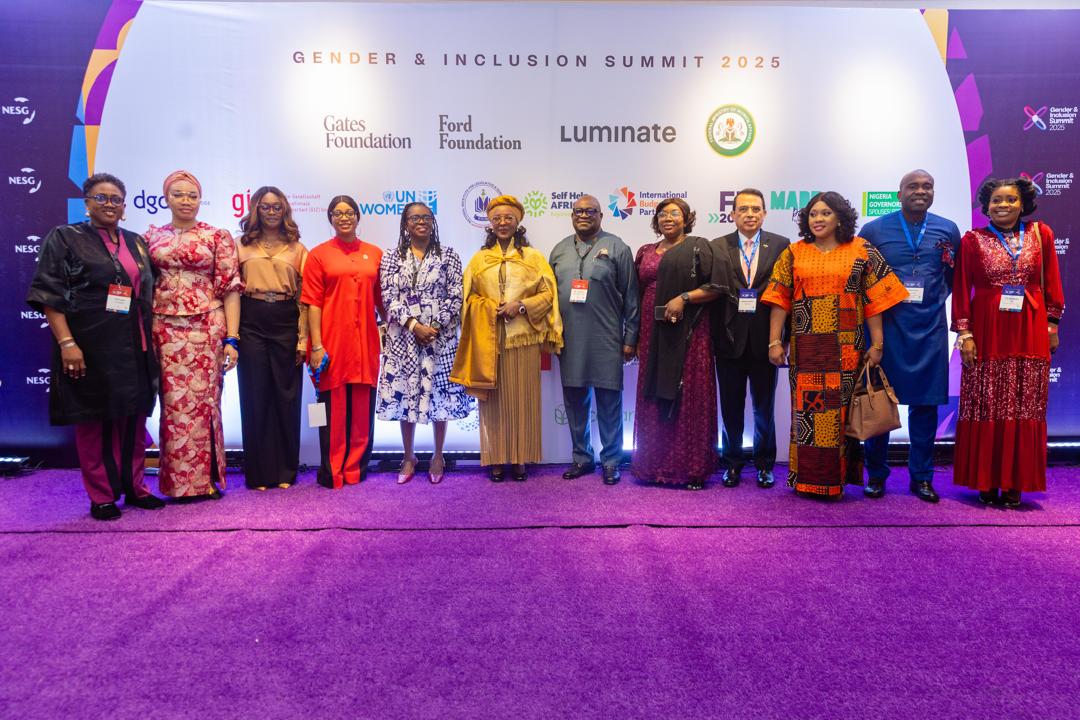By Usman Umar, in Abuja
It was the second day of the Gender and Inclusion Summit 2025, and the atmosphere at the Abuja Continental Hotel felt less like a polite policy exchange and more like a reckoning. Organised by the Policy Innovation Centre with support from government and international partners, the event drew a constellation of voices, from state first ladies to international ambassadors, from global philanthropies to women traders whose businesses rise and fall with the Naira.
Her Excellency Professor Olufolake Abdulrazaq, the First Lady of Kwara State and chair of the Nigeria Governors’ Spouses Forum, set the tone at a high-level session. She spoke of hard numbers that paint a stubborn picture: only 27% of parliamentary seats in Sub-Saharan Africa are held by women; 95% of CEOs in Africa’s largest companies are still male. Yet she also offered glimpses of progress. Kwara now enforces a 35% gender inclusion law and six-month maternity leave, with women holding half of cabinet seats. “Economic empowerment,” she said, “is not just income, but health, nutrition and equitable access to resources. We must evolve transformative strategies grounded in inclusive, equitable development.”
From another corner of the global policy ecosystem came Ekenem Isichei of the Gates Foundation. His keynote was both sobering and urgent. Nigeria, he noted, has advanced 25 places on the World Economic Forum’s Gender Gap Index for economic inclusion, driven by rising female labour participation. Yet, bilateral aid to Nigeria has dropped by 40%, with funding for maternal and child health collapsing by two-thirds. “For every three women in your community,” he warned, “two of them will not have access to critical women’s health commodities they had last year.” The Gates Foundation’s response, he announced, is a $2.5 billion commitment through 2030 exclusively for women’s health research and development. But his deeper challenge was directed at Nigerian institutions: policies are meaningless without implementation, gender-responsive budgeting must translate into disbursed funds, and “the test of inclusion is not the summit — the test is what we change after the applause dies down.”
If Abdulrazaq and Isichei gave policy heft, Mexico’s ambassador to Nigeria, Alfredo Miranda, provided global solidarity and a touch of poetry. “Gender equality is not a Western idea,” he said. “It is a universal human aspiration rooted in dignity, fairness, and opportunity.” Citing Mexico’s own struggles with gender violence, but also its reforms, constitutional gender parity in elected offices, institutionalised policies, and, for the first time, a female president-elect, he stressed that progress is not automatic but forged by persistence and law. And he linked inclusion directly to prosperity: “Closing gender gaps in labour markets could increase global GDP by trillions of dollars. Empowering women and excluded groups is not charity — it is a smart economic strategy.”
Yet perhaps the most electric moment of the day came not from a titled dignitary but from Abidogun Omolara, Iyaloja General of Ikeja, Lagos, speaking at a plenary titled From Policy to Impact: What We’ve Learned from the Domestication of the National Women’s Economic Empowerment Policy. With a trader’s bluntness, she skewered banks for demanding impossible collateral from market women while pontificating about financial inclusion. She challenged bankers to put traders on their advisory boards “to guide them appropriately.” If banks did the right thing, she argued, women would stop hiding cash under pillows and bring their savings into the financial system. The room erupted in applause.
Together, these voices, from grassroots stalls to diplomatic podiums, underlined a truth that Nigeria and its partners cannot ignore: inclusion is not a side agenda, but the backbone of economic growth, health outcomes, and political stability. What was striking in Abuja was not only the consensus that gender equity matters, but the insistence that the time for “policy frameworks” has passed. The urgency now lies in dismantling barriers, redirecting resources, and amplifying the women who already hold up the market, the classroom, and the home.




